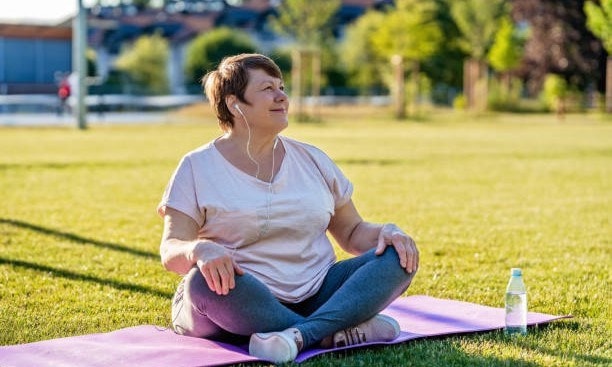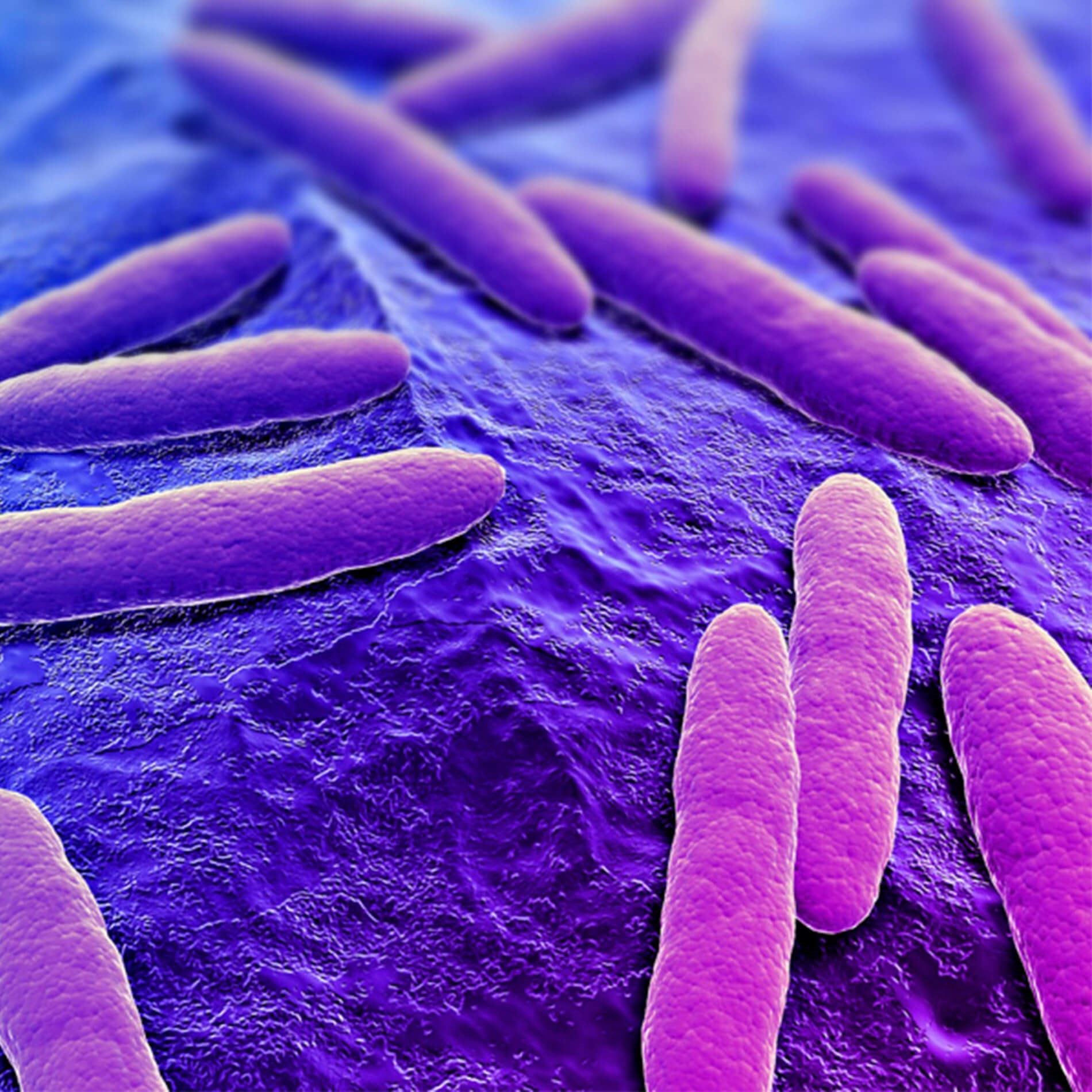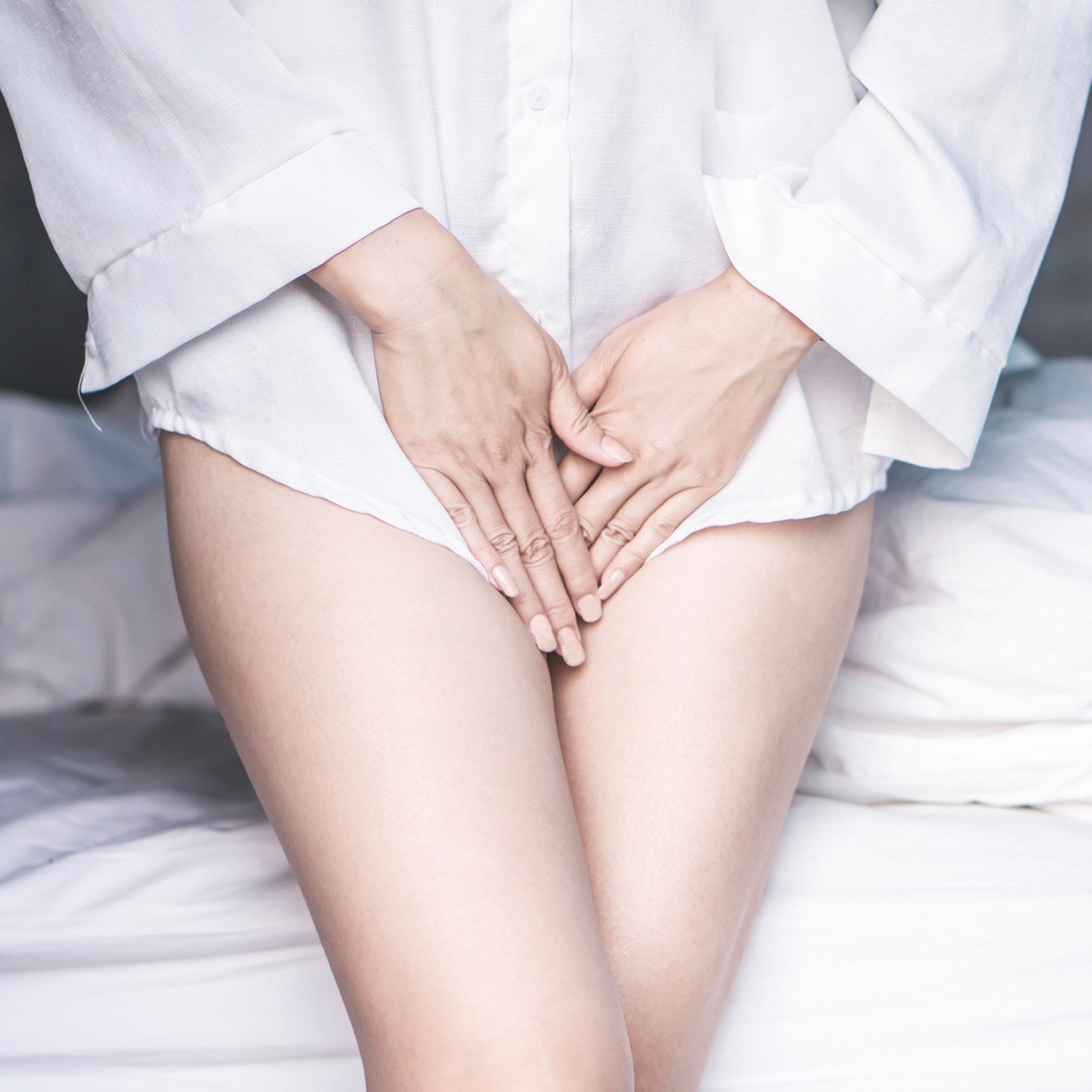Could probiotics help with menopause symptoms?
Menopause symptoms cause many women to visit their doctor or health practitioner. The symptoms can be so severe that women often fear they are suffering from serious medical conditions. We'll explain what triggers these menopausal symptoms and explain the thinking behind why probiotics for menopause may worth considering.
Menopause occurs due to a complex series of hormonal changes. As a woman’s egg reserves begin to run low, they become more resistant to FSH (follicle Stimulating Hormone); this causes a rise in FSH, and at the same time there is a big drop in oestrogen production from the ovaries. Testosterone and progesterone levels also decline. Oestrogen affects many parts of the body, including the: breasts, uterus, skin, bones and brain. For this reason, loss of oestrogen is thought to be the main culprit behind most menopausal symptoms.
To establish whether menopause has begun, doctors usually test levels of follicle-stimulating hormone (FSH) and oestrogen and may also test thyroid function as thyroid dysregulation can cause symptoms like those of menopause.
The best probiotics for menopause
Low mood during menopause
Certain strains of probiotic bacteria, such as Bifidobacterium longum Rosell-175 and Lactobacillus acidophilus/helveticus Rosell-52, have been shown to improve a low mood. In a gold standard clinical trial5 these strains showed significant improvements in depression, anxiety and mood, as well as supporting overall gut health.
Professors at Harvard Medical School 6 suggest that certain strains of bacteria can improve our mood in this way, by directly increasing the levels of certain key ‘feel good’ neurotransmitters such as GABA and serotonin in the body. The Harvard research team also suggest that these bacteria can activate neural pathways between the gut and the brain. To read more about the mood-elevating properties of probiotics, look at this article in the Probiotics Learning Lab: Psychobiotics, just a fad or here to stay?
These strains are also often used for general gut support. Read more about the research using Rosell-52 strain here in the Probiotics Database
Vaginal Health
The health of vaginal tissues is directly linked to oestrogen levels, and as these levels drop during perimenopause and then menopause, so the tissues of the vagina become less protected and less well ‘nourished’. The result is often vaginal dryness and vulvo-vaginal atrophy. But is it really the drop in oestrogen levels that causes this, or is there another link in the chain?
Research suggests that rather than lowered oestrogen directly causing vaginal changes, it may be that lowered oestrogen is simply causing a reduction in probiotic bacteria in the vagina, which then in turn leads to vaginal dryness, atrophy and the potential for vaginal infections. It is thought that probiotic bacteria modulate the immune system and interfere with the inflammatory cascade. Less inflammation means less tissue damage. Studies 7 show that oral probiotic therapy can support the vaginal ‘ecosystem’ and prevent reductions to the protective vaginal flora that may cause dryness and irritation.
Urinary tract infections (UTIs) and bacterial vaginosis (BV) are very common in menopausal women and this is likely due to the environment of the intimate area becoming less acidic, which makes it a perfect environment for bacteria to thrive and cause problems8,9. Vaginal atrophy post menopause can also cause more vaginal infections, so many women choose to continue supporting their vaginal microbiome after menopause.
The Lactobacillus reuteri RC-14® & Lactobacillus rhamnosus GR-1® strains colonise in the vagina rather than in the intestines, where they help to create an environment that inhibits pathogens but encourages beneficial bacteria to flourish. They have been used extensively in clinical trials looking at the effects of probiotics on bacterial vaginosis, thrush, and UTIs.
Read more about the research using these strains in the Probiotics Database. For more articles on vaginal health, look at these articles in the Probiotics Learning Lab:
Top Tips for Natural Menopause Support
Probiotics and Bacterial Vaginosis: ~The Facts
Your Vaginal Flora: What All Women Should Know
General Health and Gut Support
As previously mentioned, it’s so important to consider gut health as part of any supporting health protocol. This can help to improve immunity and general wellbeing. The following strains are some of most extensively researched in the world for all-round digestive health and immunity.
Lactobacillus acidophilus NCFM® has been researched to help with typical IBD symptoms of bloating, constipation and diarrhoea10 It has also been researched alongside and after antibiotics, to help rebalance the gut microbiota11.
Read more about the supporting research in this strain’s entry in the Probiotics Database.
Lactobacillus rhamnosus LGG® has been extensively researched for gut health12, and has been shown to modulate the immune system13 and support bone health (read more about this research in the next section).
Practitioners can find an overview of the research using this strain on our Probiotics Database.
Bone Density Preservation
There is much interest in the role of probiotics to reduce bone-density loss following the menopause, and although more research needs to be done, results so far are encouraging. A couple of probiotic strains have shown particular promise in this area:
In a 2016 murine study, published in the Journal of Clinical Investigation14, researchers at Georgia State University used mice that had had their ovaries removed to mimic the oestrogen loss in menopause. The mice were divided in to two groups, one of which received probiotics daily. A month after ovary removal, the mice that were not treated with the probiotics had lost half of their bone density, whereas those receiving the probiotic mix (an eight-strain blend, including Lactobacillus rhamnosus GG®) maintained their pre-operative bone density levels.
Researchers found that the protective effect that the probiotics had on bone density was caused by preventing gut permeability. A loss of oestrogen after the menopause, or in this case after the removal of ovaries, increases gut permeability, which allows bacterial products to activate immune cells. These immune cells release signals that break down bone. So, by preventing the gut permeability that is associated with oestrogen loss, probiotics were able to safeguard bone density in these mice. Senior study author, Doctor Roberto Pacifici commented that he feels that ‘there are direct implications for the treatment of osteoporosis that should be tested clinically’.
The importance of strain specific supplementation was illustrated when the mice were treated with E. coli bacteria for example, the intervention did not help to minimise bone density losses.
In other research15 at the University of Gothenburg, the bacterial strain Lactobacillus reuteri ATCCPTA 6475 was used in a clinical trial and found to reduce bone loss in older women. In the randomised controlled trial, seventy women with osteoporosis, aged between 75 and 80, received either the probiotic Lactobacillus reuteri ATCC PTA 6475, or a placebo, for one year. In the probiotic group the loss in bone density was halved compared to placebo.
“This trial provides the first evidence that age-dependent bone loss can be reduced with probiotic supplementation, which could emerge as a novel approach to prevent osteoporosis,” says Professor Mattias Lorentzon at the University of Gothenburg and Sahlgrenska University Hospital, Mölndal, Sweden.

Menopause Symptoms
The combination and severity of menopause symptoms will be unique to each woman, but typically include metrorrhagia (irregular periods), menorrhagia (heavy periods or flooding), hot flashes/flushes, night sweats/chills, loss in bone density, headaches, xerostomia (dry mouth), weight gain/bloating, loss of libido, bloating, and low mood. In some women, these symptoms continue after menopause, and may be joined by other symptoms, such as those associated with genitourinary syndrome of menopause (GSM). This manifests as vulvo-vaginal atrophy (VVA), vaginal dryness, genital itching, urination frequency and burning, and recurrent urinary tract infections.
Many women don’t need additional support, but doctors may prescribe a variety of prescription medications to help manage severe symptoms. Conventional treatments include hormone replacement therapy (HRT), which may help to improve low libido, hot flushes and sweats, and supports bone health. However, HRT may cause side effects and is not suitable for all women - for some individuals there may be an increased risk of blood clots and breast cancer1.
Other commonly used treatments include the Mirena coil for menstruation irregularities; blood pressure medications for hot flushes and sweats, low-dose antidepressants for low mood, and topical oestrogen for vaginal issues.
Due to the risks and side effects associated with these medications, some women prefer to use diet and natural supplements to help manage their menopause symptoms. To find out more about natural solutions for the menopause, read this article in our Probiotics Learning Lab.
The microbiome in menopause
One of the most important considerations in a natural health protocol for menopause is microbiome support. Everyone plays host to colonies of micro-organisms all over the body, but they are particularly prevalent in the warm moist environments such as the gut, the mouth, and in women, the vaginal tract.
It is now believed that the oral, vaginal, and gut microbiota composition can be regulated and altered by oestrogen levels. As these populations of microorganisms are implicated in multiple physiological functions, such as mood, bone homeostasis, immune function, mood, and metabolism, it’s believed that the relationship between the gut microbiota and a lack of oestrogen may be responsible for certain symptoms associated with menopause, such as dry mouth, vaginal dryness, weight gain, and a decline in bone health 2.
The importance of our natural microbiomes for good health has been well-established3 in recent years, but this relationship between the microbiota and oestrogen suggests that it could be even more important for women to keep these bacterial populations well supported as oestrogen levels decline. One way to do this is to ensure that there are plenty of fermented foods in the diet, such as kimchi, yogurts, kombucha, and sauerkraut. It’s also important for women to eat natural plant foods, beans, pulses, legumes, fruits, and vegetables, as they contain phytoestrogens which may help with hormone balance and bone health4, but also prebiotics which help to feed and support bacteria in the gut. The gut microbiome hosts the largest number of microorganisms in the body and can affect the health and composition of other bacteria populations in the body. For more information about prebiotics, look at this article in the Probiotics Learning Lab: What are prebiotics?
But it’s possible to adopt a more targeted approach when trying to support the microbiome during and after menopause, by using probiotic supplements containing strains of live cultures which have been researched for specific health conditions. Read on for an overview of some of the world’s most extensively researched strains, which have shown promise for supporting women’s’ health and common menopause symptoms:
Key takeaways
There is some convincing evidence to suggest that probiotics for menopause may have their part to play in managing the symptoms of menopause and perimenopause. It is an intriguing thought that the drop in hormone levels during menopause may not be directly responsible for menopausal symptoms, but rather the impact of this hormone’s deficit on our gut and vaginal flora. According to Dr. Lindsey Berkson's estimates in her book "Hormone Deception", only 7% of Japanese women suffer from hot flushes as opposed to 55% of women in the U.S. This lack of symptoms in Japanese women has often been put down to a diet that is rich in soy products, as soya is a good source of plant-based oestrogens. However, it could also be down to the amount of fermented foods that they eat, which provides them with a good daily dose of probiotics from traditional foods such as natto and tempeh.
Whilst more research certainly needs to be done, there can be no harm in menopausal women supporting their microbiomes by increasing the amounts of fermented foods they consume, and using a good, high-quality probiotic (or two) to improve microbial diversity in both the GI tract and also the vaginal tract, in an attempt to reduce menopausal symptoms.
References
- NHS, (2020), Risks: Hormone Replacement Therapy; accessed online,21-1-2020: https://www.nhs.uk/conditions/hormone-replacement-therapy-hrt/risks/
- Vieira A. T., et al (2017), Influence of Oral and Gut Microbiota in the Health of Menopausal Women, Frontiers in Microbiology; 8:1884 URL=https://www.frontiersin.org/article/10.3389/fmicb.2017.01884
- Valdes A. M, Walter J, Segal E, Spector T.D. (2018) Role of the gut microbiota in nutrition and health BMJ 2018; 361 :k2179
- Setchell,KDR, & Lydeking-Olsen, E. (2003), Dietary phytoestrogens and their effect on bone: evidence from in vitro and in vivo, human observational, and dietary intervention studies, The American Journal of Clinical Nutrition, Volume 78(3):593S–609S, https://doi.org/10.1093/ajcn/78.3.593S
- Messaoudi M. et al., (2011), ‘Assessment of psychotropic-like properties of a probiotic formulation (Lactobacillus helveticus R0052 and Bifidobacterium longum R0175) in rats and human subjects’. British Journal of Nutrition, 105(5):755.
- 'Fermented foods, microbiota, and mental health: ancient practice meets nutritional psychiatry' Eva M. Selhub. Journal of Physiological Anthropology, 2014.
- Hummelen, R., Macklaim, J. M., Bisanz, J. E., Hammond, J. A., McMillan, A., Vongsa, R., & Reid, G. (2011). Vaginal microbiome and epithelial gene array in post-menopausal women with moderate to severe dryness
- Morelli, L., Zonenenschain, D., Del Piano, M., & Cognein, P. (2004). Utilization of the Intestinal Tract as a Delivery System for Urogenital Probiotics. Journal of Clinical Gastroenterology, 38(Supplement 2), S107–S110.
- Beerepoot, M. A. J. (2012). Lactobacilli vs Antibiotics to Prevent Urinary Tract Infections. Archives of Internal Medicine, 172(9), 704-12.
- Faber, S.M., (2000). ‘Treatment of abnormal gut flora improves symptoms in patients with irritable bowel syndrome’. American Journal of Gastroenterology, 95(9):2533.
- Forssten, S., et al., (2014). ‘Influence of a probiotic mixture on antibiotic induced microbiota disturbances’. World Journal of Gastroenterology, 20(33):11878-85.
- Pedersen N. et al., (2014), ‘Low FODMAP diet vs Lactobacillus rhamnosus GG® in irritable bowel syndrome’. World Journal of Gastroenterology, 20(43):16215-16226.
- Schultz M. et al., (2003), ‘Immunomodulatory consequences of oral administration of Lactobacillus rhamnosus strain GG in healthy volunteers’. Journal of Dairy Research, 70(2):165
- Jau-Yi Li et al, (2016), Sex steroid deficiency–associated bone loss is microbiota dependent and prevented by probiotics, Journal of Clinical Investigation, 126(6):2049-2063
- Nilsson, A.G. et al (2018) Lactobacillus reuteri reduces bone loss in older women with low bone mineral density: a randomized, placebo‐controlled, double‐blind, clinical trial, Journal of Internal Medicine, 284(3):307-317
This FAQ has been answered in collaboration with Kathy Weddon, Nutritional Therapist DipION.
Popular Articles
View all Female Health articles-
Female Health18 Sep 2024

